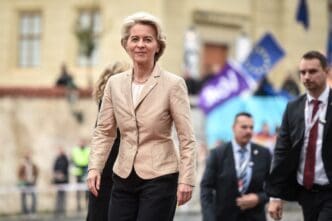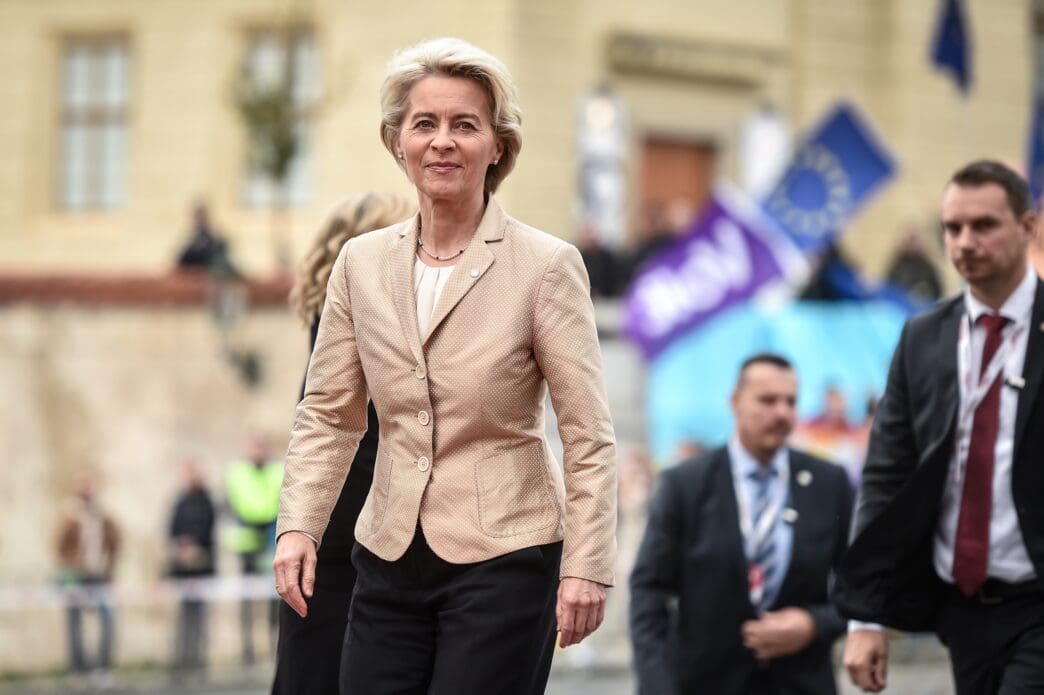Executive Summary
The Story So Far
Why This Matters
Who Thinks What?
More than 45 European leaders convened in Copenhagen on Thursday for the seventh European Political Community (EPC) summit, where urgent discussions focused on Russia’s escalating aggression in Ukraine and across Europe. Danish Prime Minister Mette Frederiksen opened the proceedings, asserting that Russia “will not stop until they are forced to do so,” setting a somber tone for talks centered on strengthening European security and deterrence.
European Unity and Deterrence
The summit saw strong warnings from several leaders about the immediate threat posed by Russia. Danish Prime Minister Mette Frederiksen underscored the necessity for Europe to become “so strong that war against us becomes unthinkable.” Polish Prime Minister Donald Tusk declared that Europe is currently facing “a war,” not merely a pre-war period, citing daily security incidents in his country and stating, “if Ukraine loses, it means our failure.”
French President Emmanuel Macron highlighted Russia’s failure to achieve its primary objectives in Ukraine and called for “more unpredictability” and “strategic ambiguity” in European deterrence. He suggested that drones violating European territories could be destroyed without prior notice to preserve air and territorial integrity. Macron also advocated for the swift adoption of a 19th package of sanctions against Russia and increased pressure on its “shadow fleet” to cut off war financing.
Ukrainian President Volodymyr Zelenskyy told leaders that Europe is in a “new reality,” warning that recent drone incidents across the continent indicate Russia’s continued boldness to escalate the conflict. He urged fast-track adoption of the 19th sanctions package and called for support for President Trump’s suggestion to halt European purchases of Russian oil. President Zelenskyy also pushed for the opening of formal EU accession talks for Ukraine and Moldova.
UK Prime Minister Keir Starmer, who departed early due to a synagogue attack in Manchester, emphasized President Putin’s “unrelenting” appetite for interference across Europe, extending beyond Ukraine to airspace and cyberattacks. He stressed that the conflict is a matter of shared European values and freedoms.
Aid to Ukraine and Russian Assets
German Chancellor Friedrich Merz reported a “great determination” among EU leaders to continue helping Ukraine and to utilize frozen Russian assets for aid. He indicated a “very strong agreement” to explore these options, with a concrete decision anticipated at the next European Council meeting in late October. Merz warned that President Putin “should not underestimate our determination.”
However, the Belgian Prime Minister reiterated legal questions surrounding the use of frozen Russian assets, suggesting continued complexities in the discussions. Hungarian Prime Minister Viktor Orbán questioned why Europe fears Russia, insisting the EU is “stronger,” while the Irish Prime Minister warned of a “degree of naivety” in Ireland regarding the “existential” Russian threat.
Recent Incidents and Policy Shifts
Amidst the high-level talks, several incidents highlighted the ongoing tensions. The Polish border force responded to a Russian fishing boat observed near a gas pipeline off Szczecin. Separately, Russia was accused of deliberately sabotaging the last power line into the Zaporizhzhia nuclear plant, with satellite imagery reportedly showing no evidence of Ukrainian shelling that Moscow had claimed was impeding repairs. The plant is currently relying on back-up diesel generators for cooling.
Reports also indicated a significant policy shift from the United States, which plans to provide Ukraine with intelligence on long-range energy infrastructure targets deep inside Russia. This move is attributed to recent comments by President Trump suggesting Ukraine could reclaim occupied territories. No decision has been made on supplying Tomahawk cruise missiles to Ukraine.
Further demonstrating the pressure on Russia’s operations, the Chinese captain of the ‘Boracay,’ a Benin-flagged tanker from Russia’s “shadow fleet” blacklisted by the EU, is to be tried in a French court for refusing to comply with French authorities.
Moldova’s Resilience
Moldovan President Maia Sandu detailed Russia’s attempts to interfere with her country’s democratic process through disinformation and corruption. She expressed hope that Moldova’s success in resisting these efforts would encourage other nations, asserting that if “a small and fragile democracy” like Moldova could resist, then “everybody can do it.”
The Copenhagen summit underscored a unified European resolve to confront Russia’s multifaceted aggression, bolster Ukraine’s defense, and enhance collective security. Leaders emphasized the urgent need for decisive action, from sanctions and military aid to strengthening deterrence and addressing direct provocations to safeguard European stability.








